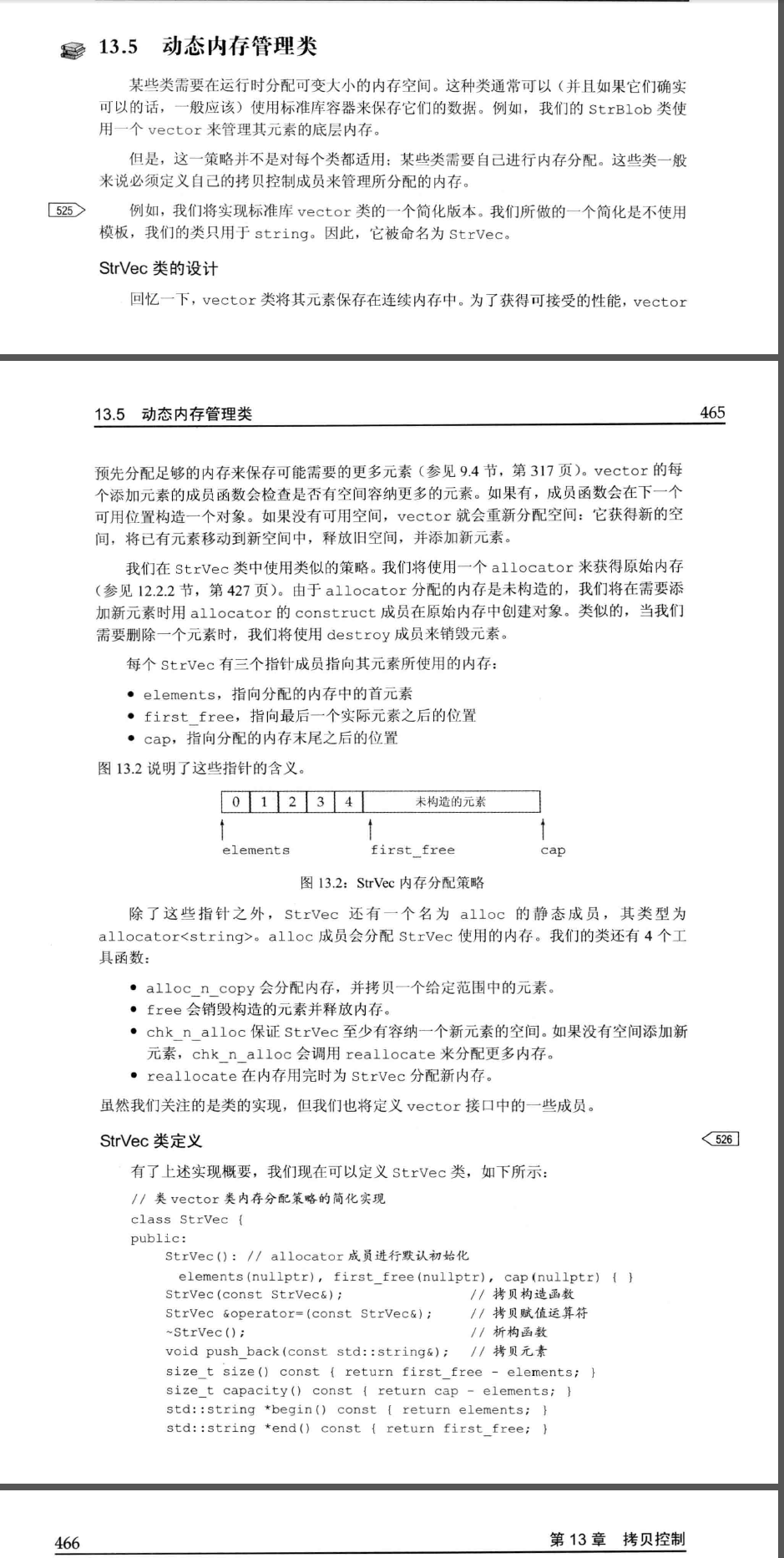头文件vec.h
#ifndef VEC_H
#define VEC_H
#pragma warning(disable:4996)
#include <memory>
/**
* @brief a vector like class
*/
template<typename T>
class Vec
{
public:
Vec() :element(nullptr), first_free(nullptr), cap(nullptr){ }
Vec(std::initializer_list<T> l);
Vec(const Vec& v);
Vec& operator =(const Vec& rhs);
~Vec();
//! memmbers
void push_back(const T& t);
std::size_t size() const { return first_free - element; }
std::size_t capacity()const { return cap - element; }
T* begin() const { return element; }
T* end() const { return first_free; }
void reserve(std::size_t n);
void resize(std::size_t n);
void resize(std::size_t n, const T& t);
private:
//! data members
T* element;
T* first_free;
T* cap;
std::allocator<T> alloc;
//! utillities
void reallocate();
void chk_n_alloc() { if (size() == capacity()) reallocate(); }
void free();
void wy_alloc_n_move(std::size_t n);
std::pair<T*, T*> alloc_n_copy(T* b, T* e);
};
//! copy constructor
template<typename T>
Vec<T>::Vec(const Vec &v)
{
/**
* @brief newData is a pair of pointers pointing to newly allocated and copied
* from range : [b, e)
*/
std::pair<T*, T*> newData = alloc_n_copy(v.begin(), v.end());
element = newData.first;
first_free = cap = newData.second;
}
//! constructor that takes initializer_list<T>
template<typename T>
Vec<T>::Vec(std::initializer_list<T> l)
{
//! allocate memory as large as l.size()
T* const newData = alloc.allocate(l.size());
//! copy elements from l to the address allocated
T* p = newData;
for (const auto &t : l)
alloc.construct(p++, t);
//! build data structure
element = newData;
first_free = cap = element + l.size();
}
//! operator =
template<typename T>
Vec<T>& Vec<T>::operator =(const Vec& rhs)
{
//! allocate and copy first to protect against self_assignment
std::pair<T*, T*> newData = alloc_n_copy(rhs.begin(), rhs.end());
//! destroy and deallocate
free();
//! update data structure
element = newData.first;
first_free = cap = newData.second;
return *this;
}
//! destructor
template<typename T>
Vec<T>::~Vec()
{
free();
}
/**
* @brief allocate new memeory if nessary and push back the new T
* @param t new T
*/
template<typename T>
void Vec<T>::push_back(const T &t)
{
chk_n_alloc();
alloc.construct(first_free++, t);
}
/**
* @brief preallocate enough memory for specified number of elements
* @param n number of elements required
*/
template<typename T>
void Vec<T>::reserve(std::size_t n)
{
//! if n too small, just return without doing anything
if (n <= capacity()) return;
//! allocate new memory and move data from old address to the new one
wy_alloc_n_move(n);
}
/**
* @brief Resizes to the specified number of elements.
* @param n Number of elements the %vector should contain.
*
* This function will resize it to the specified
* number of elements. If the number is smaller than the
* current size it is truncated, otherwise
* default constructed elements are appended.
*/
template<typename T>
void Vec<T>::resize(std::size_t n)
{
resize(n, T());
}
/**
* @brief Resizes it to the specified number of elements.
* @param __new_size Number of elements it should contain.
* @param __x Data with which new elements should be populated.
*
* This function will resize it to the specified
* number of elements. If the number is smaller than the
* current size the it is truncated, otherwise
* the it is extended and new elements are populated with
* given data.
*/
template<typename T>
void Vec<T>::resize(std::size_t n, const T &t)
{
if (n < size())
{
//! destroy the range [element+n, first_free) using destructor
for (auto p = element + n; p != first_free;)
alloc.destroy(p++);
//! update first_free to point to the new address
first_free = element + n;
}
else if (n > size())
{
for (auto i = size(); i != n; ++i)
push_back(t);
}
}
/**
* @brief allocate new space for the given range and copy them into it
* @param b
* @param e
* @return a pair of pointers pointing to [first element , one past the last) in the new space
*/
template<typename T>
std::pair<T*, T*>
Vec<T>::alloc_n_copy(T *b, T *e)
{
//! calculate the size needed and allocate space accordingly
T* data = alloc.allocate(e - b);
return{ data, std::uninitialized_copy(b, e, data) };
//! ^^^^^^^^^^^^^^^^^^^^^^^^^^^^^^^^^^^
//! which copies the range[first,last) to the space to which
//! the starting address data is pointing.
//! This function returns a pointer to one past the last element
}
/**
* @brief destroy the elements and deallocate the space previously allocated.
*/
template<typename T>
void Vec<T>::free()
{
//! if not nullptr
if (element)
{
//! destroy it in reverse order.
for (auto p = first_free; p != element;)
alloc.destroy(--p);
alloc.deallocate(element, capacity());
}
}
/**
* @brief allocate memory for spicified number of elements
* @param n
* @note it's user's responsibility to ensure that @param n is greater than
* the current capacity.
*/
template<typename T>
void Vec<T>::wy_alloc_n_move(std::size_t n)
{
//! allocate as required.
std::size_t newCapacity = n;
T* newData = alloc.allocate(newCapacity);
//! move the data from old place to the new one
T* dest = newData;
T* old = element;
for (std::size_t i = 0; i != size(); ++i)
alloc.construct(dest++, std::move(*old++));
free();
//! update data structure
element = newData;
first_free = dest;
cap = element + newCapacity;
}
/**
* @brief Double the capacity and using std::move move the original data to the newly
* allocated memory
*/
template<typename T>
void Vec<T>::reallocate()
{
//! calculate the new capacity required
std::size_t newCapacity = size() ? 2 * size() : 1;
//! allocate and move old data to the new space
wy_alloc_n_move(newCapacity);
}
#endif // VEC_H测试文件:
test.c
#include "vec.h"
#include <vector>
#include <iostream>
int main()
{
Vec<int> v = { 1, 2, 3, 4, 5 };
Vec<int> v2;
v2 = v;
std::cout << v2.capacity() << "\n";
v2.push_back(99);
v2.resize(2, 2);
for (auto t : v2)
std::cout << t << " ";
std::cout << v2.capacity() << "\n";
system("pause");
return 0;
}运行结果;
5
1 2 10
请按任意键继续. . .
























 2850
2850

 被折叠的 条评论
为什么被折叠?
被折叠的 条评论
为什么被折叠?








